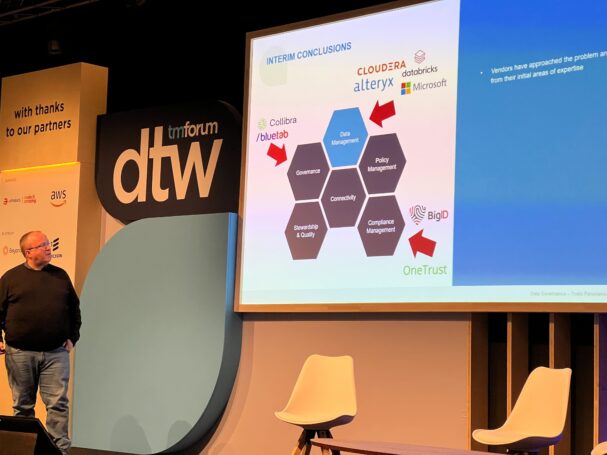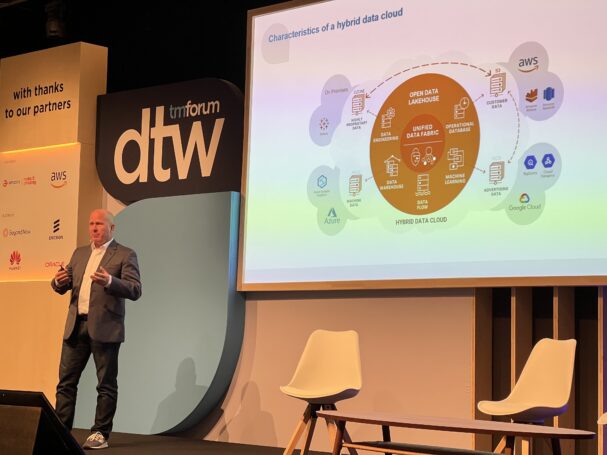The telecommunications industry continues to develop hybrid data architectures to support data workload virtualization and cloud migration. However, while the promise of the cloud remains essential—not just for data workloads but also for network virtualisation and B2B offerings—the sheer volume and scale of data in the industry require careful management of the “journey to the cloud.”
For the first time after almost three years, the TM Forum annual Digital Transformation World conference brought over 3,000 delegates from all over the telco world to Copenhagen, Denmark to meet in person. With multiple speaking tracks focusing on technology, networks, and data & AI, industry leaders repeatedly highlighted the hybrid nature of their infrastructure.
Here are the three key takeaways from the conference.
1- Cloud. But not just the public cloud.
Telco organizations are planning to move towards hybrid multi-cloud to manage data better and support their workforces in the near future. In the Hybrid Data Architectures survey report conducted by 451 Research, a part of S&P Global Market Intelligence, nearly 60% of telco organizations reported having repatriated data/analytics workloads from public cloud environments to on-premises/colocation data center environments during the past 12 months. The hybrid cloud gives organizations the agility they desire, particularly when thinking about the need to process data quickly and efficiently across several different environments.
Telco industry executives Jinsoo Jang of LG Uplus and Patrick de Vries of KPN spoke at a Modern Data Architecture for Telco lunch, hosted by Cloudera. They shared how their network analytics platforms—NRAP for LG Uplus and UDEX for KPN—deliver critical on-prem workloads at tremendous scale and speed.
The growing data volume, which is as much as 400 terabytes daily for LG Uplus, made them extend their data workload into a hybrid cloud.
Factors other than scale are also driving these architectural decisions. For example, concerns about compliance with volatile data protection regulations, the need for multi-cloud capabilities, and the demands of enterprise customers (especially the government) require data architecture options. Most of all, cost concerns continue to weigh cloud migrations, and workload repatriations are increasingly common.

In the Data Governance Masterclass, the tools review identified Cloudera as a Telco Data Governance leader for Data Management
2- AI capability drives data monetization
With the rapid rise of technologies such as wearable personal devices, smart trackers, and mobile devices, telco companies are flooded with massive amounts of data every day. Telco organizations are leveraging the broad-based integrated data that they have access to, to train highly accurate AI models executing across the business, from predictive maintenance and intelligent anomaly detection on the network, to preemptive customer support and lifetime value optimization.
Partnering with Robi Axiata, Clarity, Exfo, and BolgiaTen, Cloudera is among the 40 TM Forum Catalysts group teams solving shared challenges with forward-thinking solutions.
We demonstrated AI@Scale, focusing on the need for ML Ops to support AI model governance automation, which allows more models to be deployed concurrently and across ever larger data sets. This level of support is essential for next-generation automation in telco operations, and the Cloudera Data Platform enabled the end-to-end solution.

Steve Bowker, BolgiaTen; A. K. M. Ziaul Haque, senior vice president at Robi Axiata; and Anthony Behan, Cloudera, presenting the AI@Scale Catalyst at Digital Transformation World in Copenhagen.
3- Security and data governance are still the priority
Other topics on the data and AI track included data governance, an increasingly important subject for telco service providers. Enterprise governance, enabling audit-ability and transparency, and solutions that drive resiliency into data operations are crucial for service provider success. In addition, growing security threats and the need to enhance the delivery of real-time business insights drive demand for comprehensive governance as part of modern data architecture.

Wim Stoop of Cloudera with his contribution to the Data Governance Masterclass on the need for Telco Data Governance regimes to orchestrate across multiple clouds, public and private.
The hybrid future outlines the need for a hybrid, multi-cloud data architecture. Most telco attendees agree that organizations implementing a hybrid architecture as part of their data strategy will gain a competitive advantage.
Cloudera empowers telco organizations with a hybrid data platform to deliver precise and actionable insights at scale. Over 80% of the world’s leading (Top 100) CSPs trust and rely on Cloudera to drive analytics and insights on data, in networks, marketing, and across the enterprise, from edge to AI. Learn more and hear about some cool customer examples on our telco page.
Cloudera continues to work with the TM Forum on a collaboration group working on data governance, AI governance, and other areas.
If you’re a telco and would like to work on these industry programs, let’s connect!




